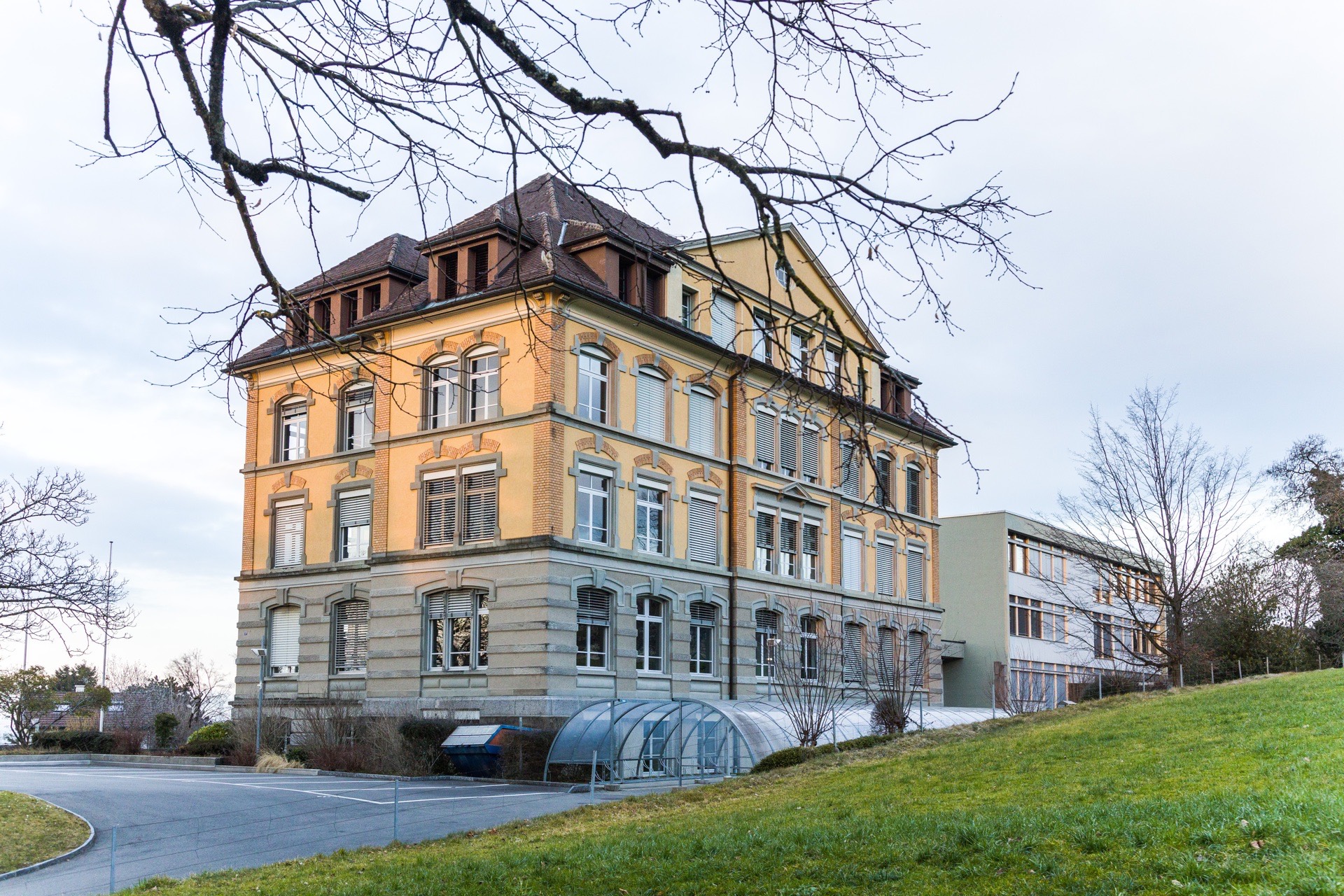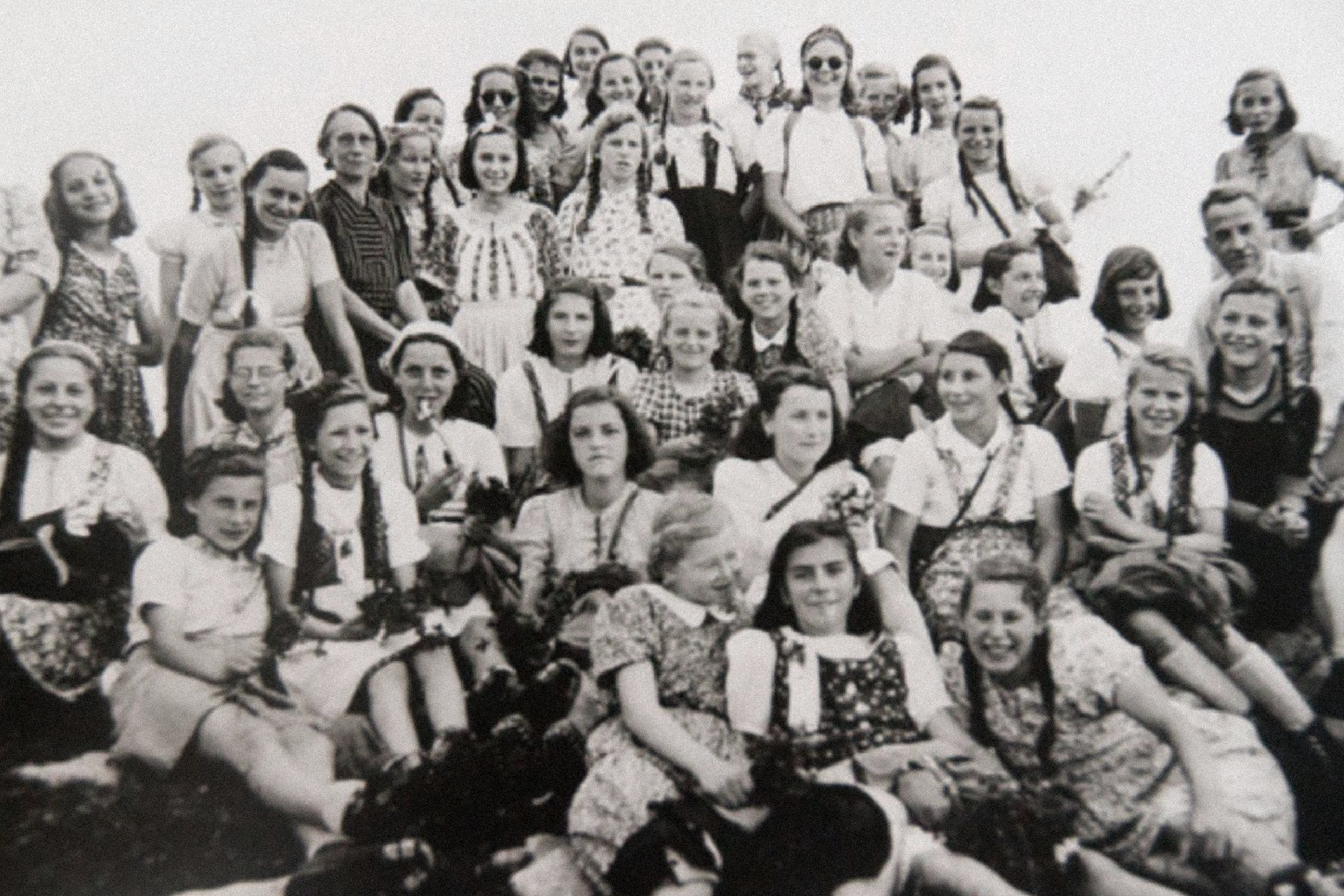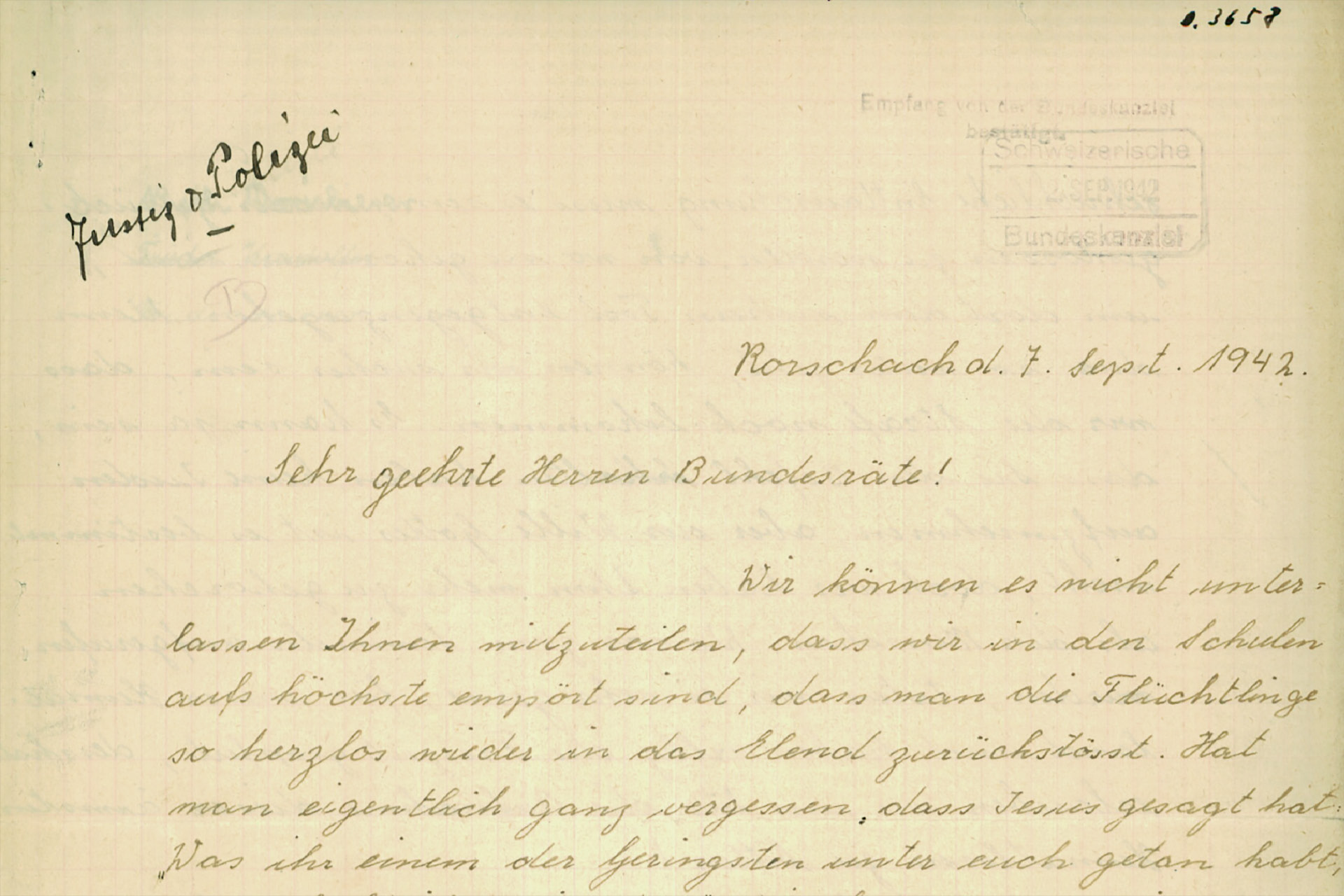7 Rorschacher Schülerinnen> 7. Dezember 1942
Text einblenden:
7 Twentytwo Rorschach schoolgirls
Twentytwo Rorschach schoolgirls protest against Swiss refugee policy
Rorschach, September 7, 1942
In August 1942, the Swiss Federal Council finally closes the borders to Jewish refugees. The Swiss federal authorities had already known since 1941 that Jews in the German Reich and in the occupied territories were now being systematically murdered.
On September 7, 1942, 22 pupils from class 2c of the girls' secondary school in Rorschach write a letter to the Swiss Federal Council. The schoolgirls had just learned from the Ostschweizer Tagblatt that a Jewish family had managed to escape from Nazi Germany via the Jura into western Switzerland, but was subsequently apprehended and sent back across the border to certain death.
“Rorschach, September 7, 1942.
Dear Federal Councillors!
We cannot refrain from informing you that we in the schools are highly indignant that the refugees are being so heartlessly pushed back into misery. Have they actually completely forgotten that Jesus said: 'Inasmuch as you did it to one of the least of these, you did it to me'? We would never have dreamed that Switzerland, the island of peace, which wants to be merciful, would throw these shivering, freezing wretched people across the border like animals. Will we not be like the rich man who did not see poor Lazarus. What use is it to us if we can say: Yes, in the last world war Switzerland still did something, could we only mention what good Switzerland has already done in this war, especially to the emigrants. Didn't all these people put all their hopes in our country, and what a cruel, terrible disappointment it must be to be pushed back again from where they came to meet certain death. If this goes on, we can be sure that we will still be punished. It may well be that you have received orders not to receive Jews, but it is certainly not the will of God, yet we have to obey Him more than men. Where we were called upon to collect, we did it very gladly for our homeland and willingly sacrificed our free time, so we take the liberty of asking for the admission of these poorest homeless people!
With respect and patriotic solidarity greetings:
Secondary school class 2c”[1]
The Federal Council reacts. But in a different way than the students had imagined. The government obviously senses a politically controlled revolt. Minister of Justice Eduard von Steiger personally orders a strict investigation and interrogation of the students. On 23 October 1942, the children are questioned for two and a half hours in the presence of the president of the school board. The investigator begins with Heidi Weber, who wrote the first draft of the letter.
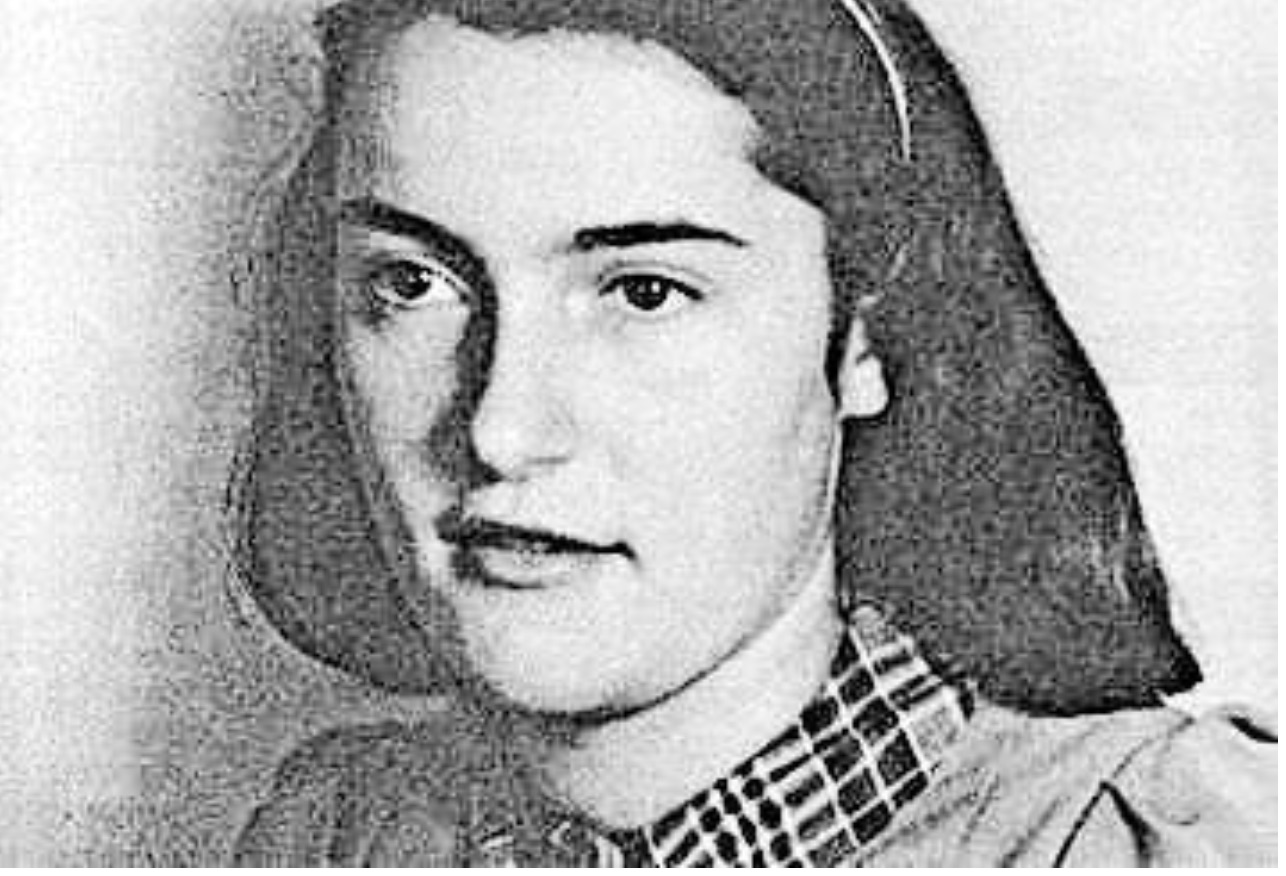
Heidi Weber, Quelle: Picasa
Question: “Who wrote the letter?”
Answer: “I did”
Question: “Did anyone help you write it?”
Answer: “No, that is, my mother only told me what kind of ending to make, because I had no knowledge of how to do that with federal councillors.”
Question: “Did your mother read the letter?”
Answer: “Yes”
Question: “Did she agree with its contents?”
Answer: “Mother said nothing about what was written, only that it was right that we wrote.”
Question: “Did you show the letter to anyone before you shipped it; a teacher or any other adult?”
Answer: “No, we found we wanted to do this all by ourselves, then no one would interfere with us.”
(...)
Question: “Is there nothing in the letter that could be an insult to the Federal Council?”
Answer: “No, I don't think so. And the Federal Council will probably have received more letters like that.”
Question: “So you did want to reproach him?”
Answer: “No, no (...) Yes, why, did the Federal Council complain?”
Question: “Yes, a complaint was received and we have to investigate what you wanted with the letter.”
The president of the school council reads out a passage: “It may well be that you have received orders not to accept any more Jews, but it is certainly not the will of God...”
Question: “Don't you know the serious meaning of this sentence?”
Answer: “I wanted to say with this sentence that we understand if the Federal Council took the Germans into consideration, just as it had to take them into consideration when introducing the blackout, because it would not have been necessary for Switzerland itself to black out.”
Interrogator: “How do you know that?”
Answer: “Yes, they say that everywhere.”
The president of the school board intervenes again: “Then I will tell you what this sentence means: the Federal Council would have stopped the flow of refugees due to foreign pressure. That means that the Federal Council is no longer its own lord and master, it can no longer do what it thinks is right, it is no longer free, but has to do what the Germans tell it to do. This is an insult to the Federal Council, which it rightly complains about. For it is a strong piece of work that a few young, inexperienced girls, who hardly know what is necessary for life at all, believe they have to teach the Federal Councillor in Bern.”[2]
The teacher of the class, Richard Grünberger, is also interrogated, under the suspicion that he may have given the impetus for the letter. In the end, the pupils are strictly admonished.
[1] Diplomatic Documents of Switzerland, https://dodis.ch/35365
[2] Investigation protocol from 23.10.1942, Diplomatic Documents of Switzerland, https://dodis.ch/35365
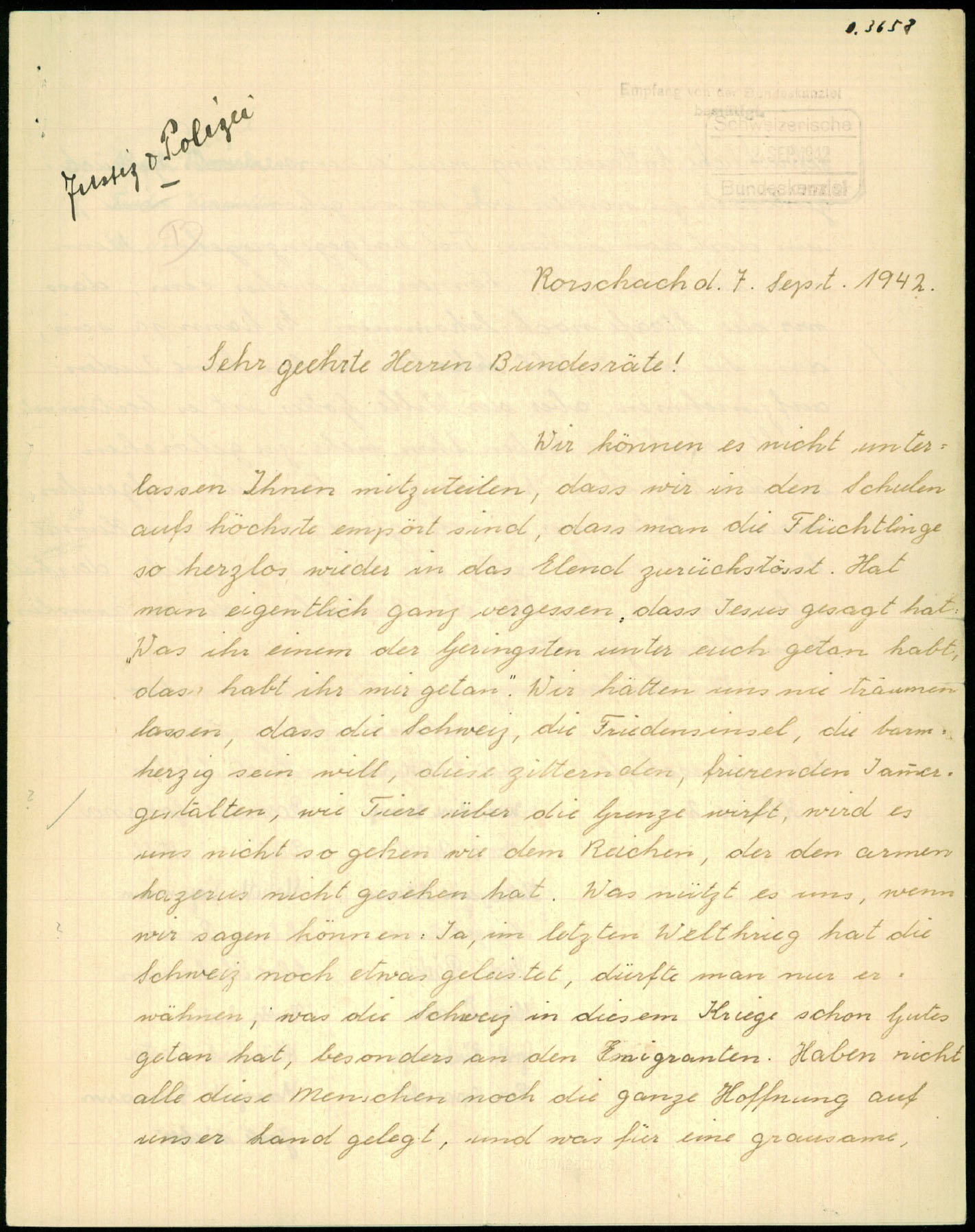
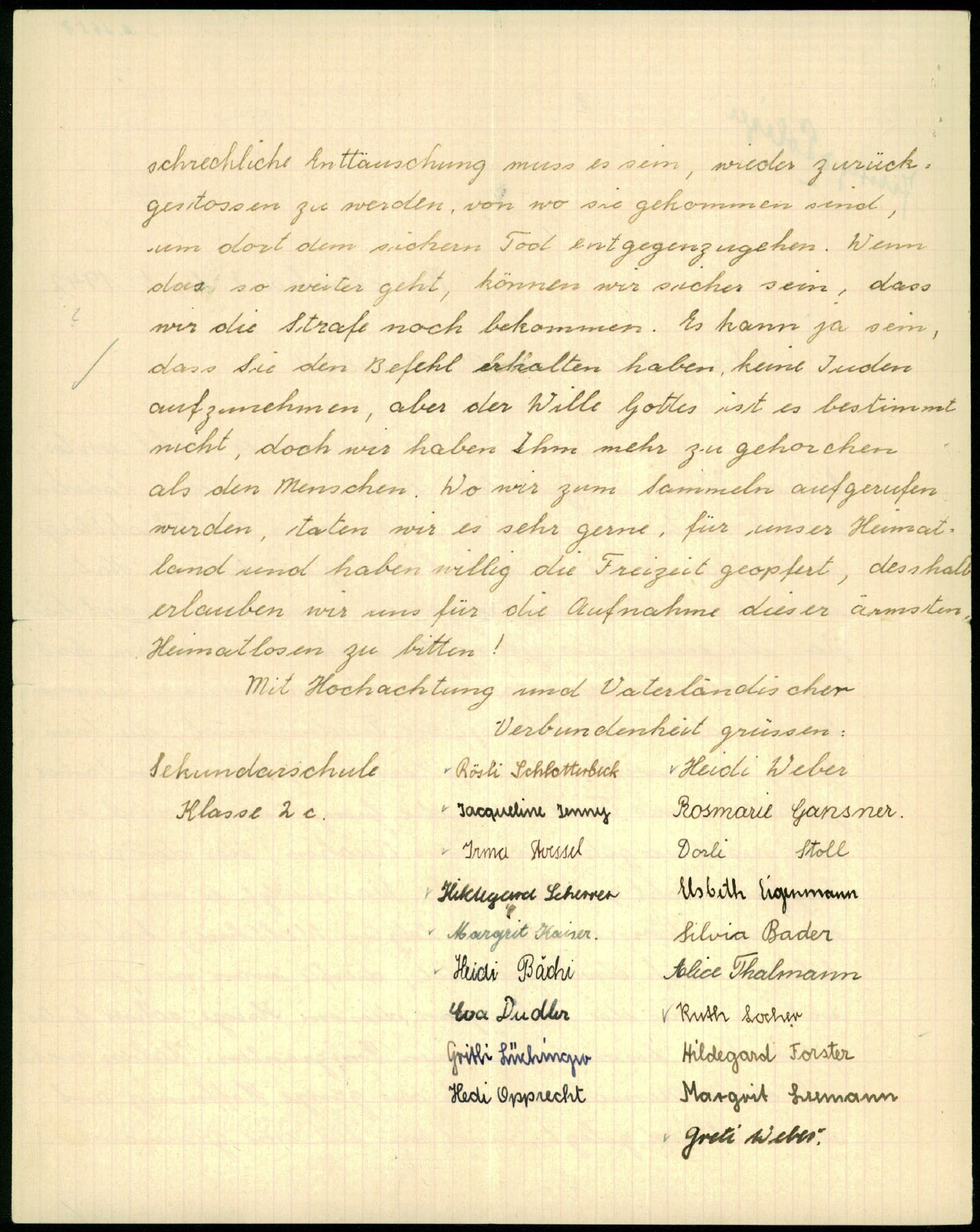
Letter from 22 schoolgirls of class 2c Rorschach Girls' Secondary School to the Swiss Federal Council, September 7, 1942
Source: Diplomatic Documents of Switzerland, 3244
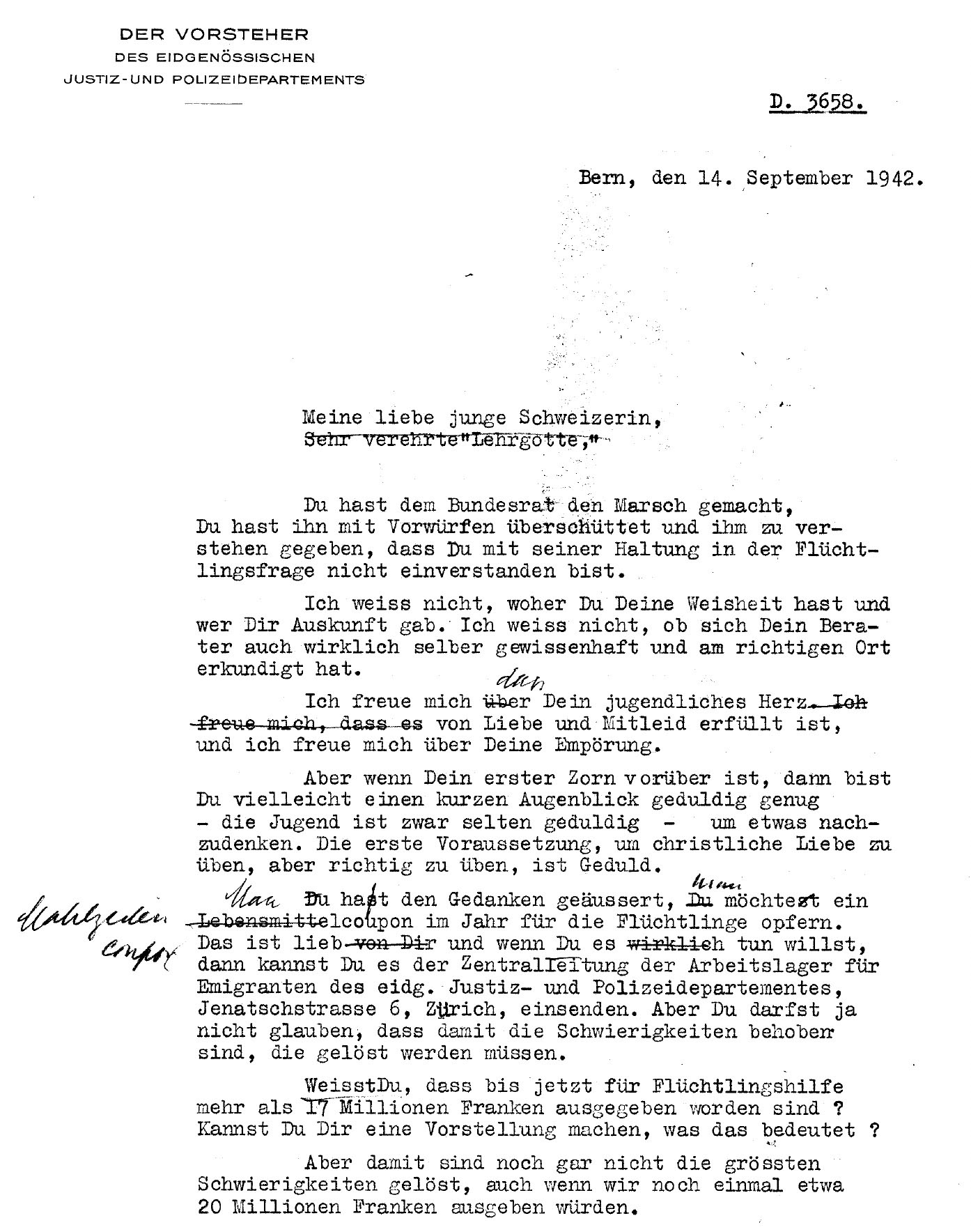
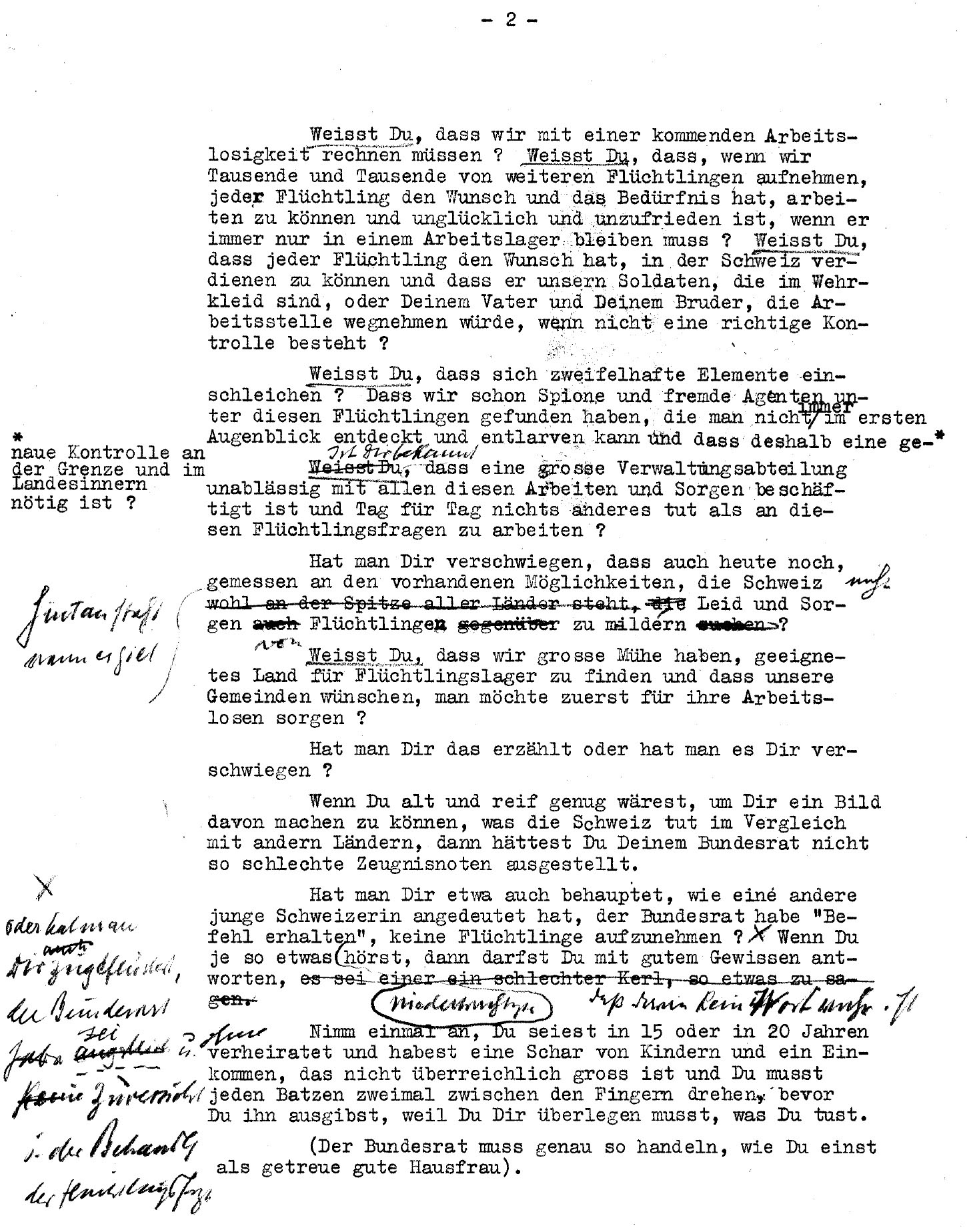
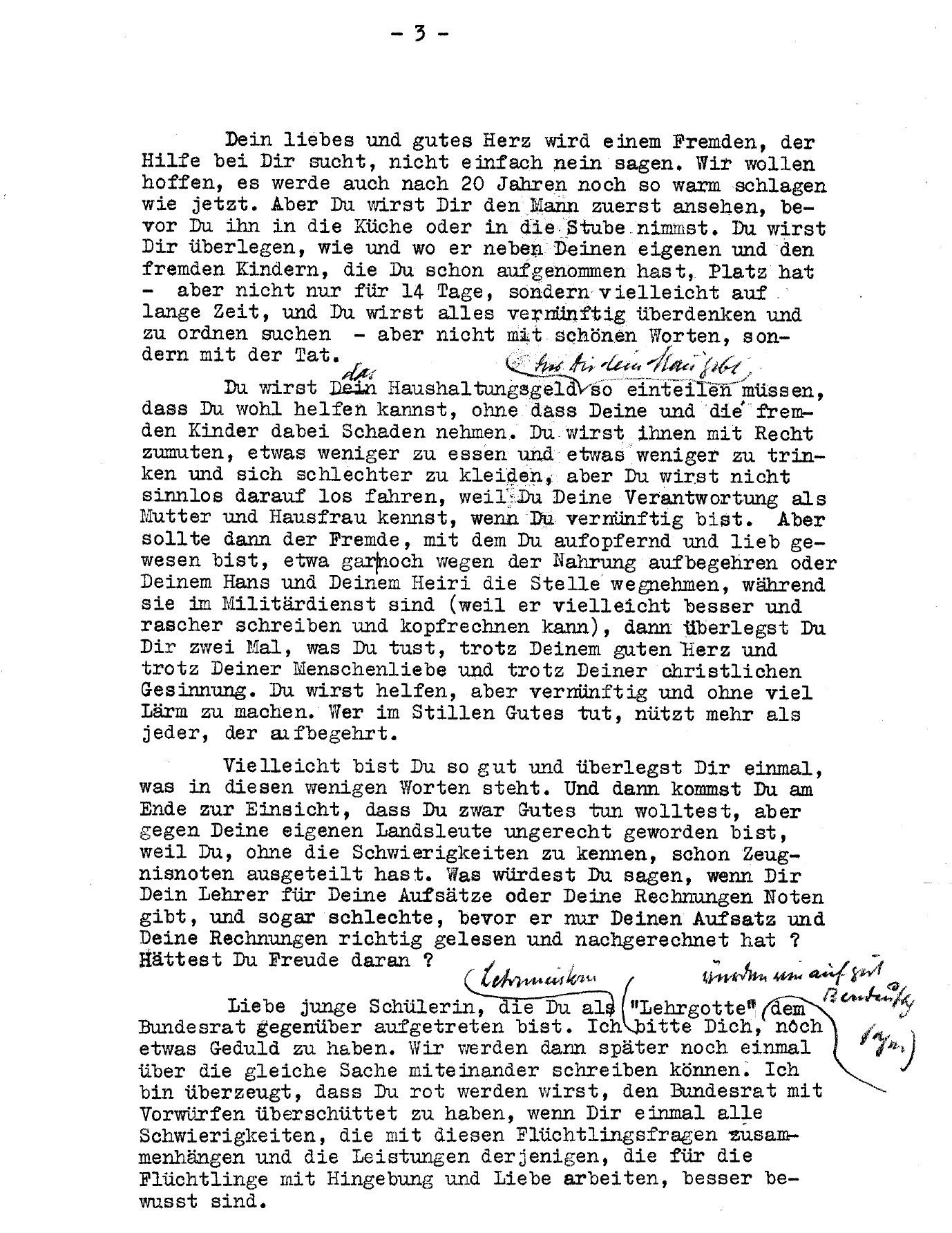
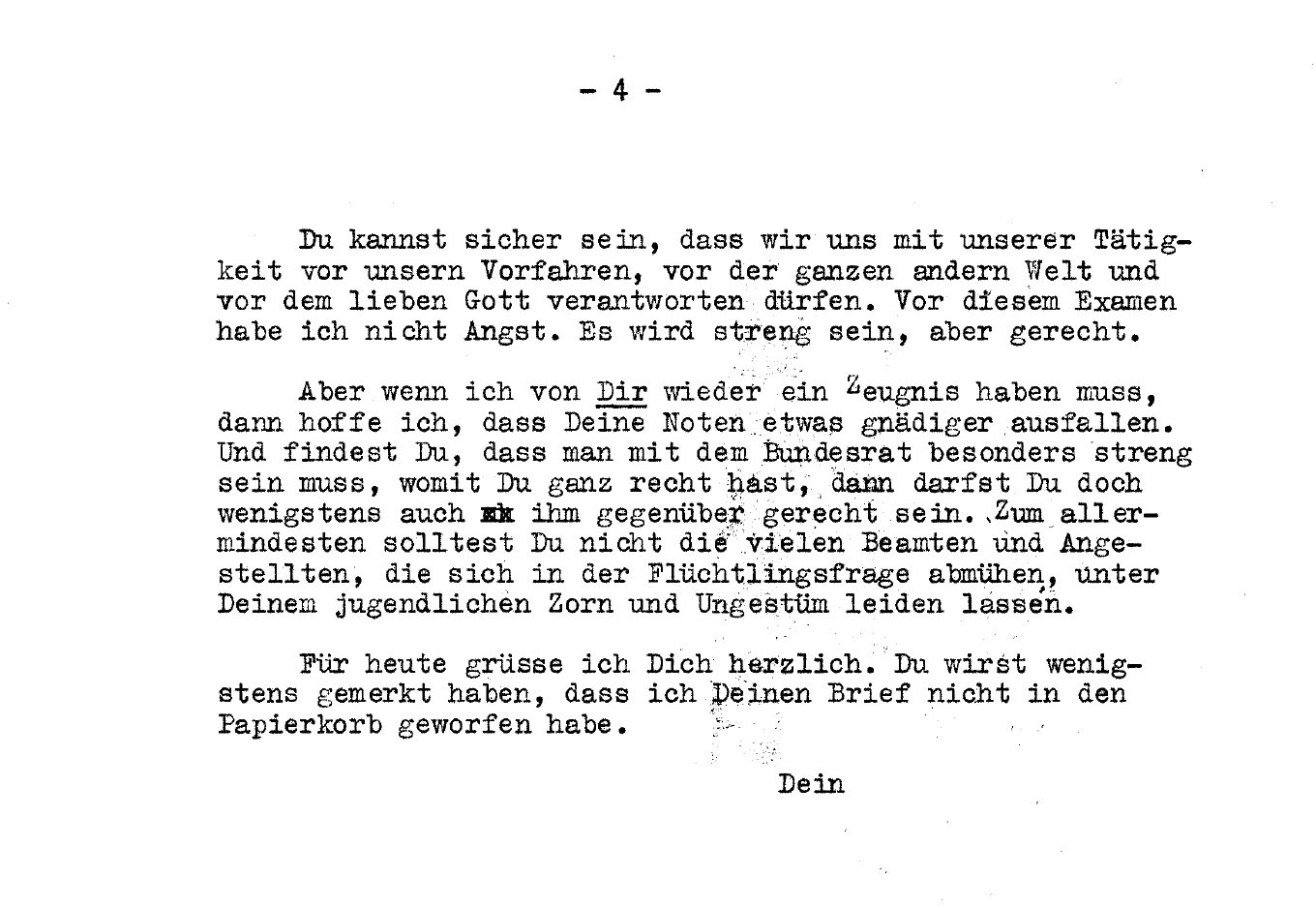
Draft letter from the head of the Federal Department of Justice and Police, Heinrich Rothmund, Bern, September 14, 1942.
Source: Diplomatic Documents of Switzerland, 12055
7 Twentytwo Rorschach schoolgirls
Twentytwo Rorschach schoolgirls protest against Swiss refugee policy
Rorschach, September 7, 1942
In August 1942, the Swiss Federal Council finally closes the borders to Jewish refugees. The Swiss federal authorities had already known since 1941 that Jews in the German Reich and in the occupied territories were now being systematically murdered.
On September 7, 1942, 22 pupils from class 2c of the girls' secondary school in Rorschach write a letter to the Swiss Federal Council. The schoolgirls had just learned from the Ostschweizer Tagblatt that a Jewish family had managed to escape from Nazi Germany via the Jura into western Switzerland, but was subsequently apprehended and sent back across the border to certain death.
“Rorschach, September 7, 1942.
Dear Federal Councillors!
We cannot refrain from informing you that we in the schools are highly indignant that the refugees are being so heartlessly pushed back into misery. Have they actually completely forgotten that Jesus said: 'Inasmuch as you did it to one of the least of these, you did it to me'? We would never have dreamed that Switzerland, the island of peace, which wants to be merciful, would throw these shivering, freezing wretched people across the border like animals. Will we not be like the rich man who did not see poor Lazarus. What use is it to us if we can say: Yes, in the last world war Switzerland still did something, could we only mention what good Switzerland has already done in this war, especially to the emigrants. Didn't all these people put all their hopes in our country, and what a cruel, terrible disappointment it must be to be pushed back again from where they came to meet certain death. If this goes on, we can be sure that we will still be punished. It may well be that you have received orders not to receive Jews, but it is certainly not the will of God, yet we have to obey Him more than men. Where we were called upon to collect, we did it very gladly for our homeland and willingly sacrificed our free time, so we take the liberty of asking for the admission of these poorest homeless people!
With respect and patriotic solidarity greetings:
Secondary school class 2c”[1]
The Federal Council reacts. But in a different way than the students had imagined. The government obviously senses a politically controlled revolt. Minister of Justice Eduard von Steiger personally orders a strict investigation and interrogation of the students. On 23 October 1942, the children are questioned for two and a half hours in the presence of the president of the school board. The investigator begins with Heidi Weber, who wrote the first draft of the letter.

Heidi Weber, Quelle: Picasa
Question: “Who wrote the letter?”
Answer: “I did”
Question: “Did anyone help you write it?”
Answer: “No, that is, my mother only told me what kind of ending to make, because I had no knowledge of how to do that with federal councillors.”
Question: “Did your mother read the letter?”
Answer: “Yes”
Question: “Did she agree with its contents?”
Answer: “Mother said nothing about what was written, only that it was right that we wrote.”
Question: “Did you show the letter to anyone before you shipped it; a teacher or any other adult?”
Answer: “No, we found we wanted to do this all by ourselves, then no one would interfere with us.”
(...)
Question: “Is there nothing in the letter that could be an insult to the Federal Council?”
Answer: “No, I don't think so. And the Federal Council will probably have received more letters like that.”
Question: “So you did want to reproach him?”
Answer: “No, no (...) Yes, why, did the Federal Council complain?”
Question: “Yes, a complaint was received and we have to investigate what you wanted with the letter.”
The president of the school council reads out a passage: “It may well be that you have received orders not to accept any more Jews, but it is certainly not the will of God...”
Question: “Don't you know the serious meaning of this sentence?”
Answer: “I wanted to say with this sentence that we understand if the Federal Council took the Germans into consideration, just as it had to take them into consideration when introducing the blackout, because it would not have been necessary for Switzerland itself to black out.”
Interrogator: “How do you know that?”
Answer: “Yes, they say that everywhere.”
The president of the school board intervenes again: “Then I will tell you what this sentence means: the Federal Council would have stopped the flow of refugees due to foreign pressure. That means that the Federal Council is no longer its own lord and master, it can no longer do what it thinks is right, it is no longer free, but has to do what the Germans tell it to do. This is an insult to the Federal Council, which it rightly complains about. For it is a strong piece of work that a few young, inexperienced girls, who hardly know what is necessary for life at all, believe they have to teach the Federal Councillor in Bern.”[2]
The teacher of the class, Richard Grünberger, is also interrogated, under the suspicion that he may have given the impetus for the letter. In the end, the pupils are strictly admonished.
[1] Diplomatic Documents of Switzerland, https://dodis.ch/35365
[2] Investigation protocol from 23.10.1942, Diplomatic Documents of Switzerland, https://dodis.ch/35365


Letter from 22 schoolgirls of class 2c Rorschach Girls' Secondary School to the Swiss Federal Council, September 7, 1942
Source: Diplomatic Documents of Switzerland, 3244




